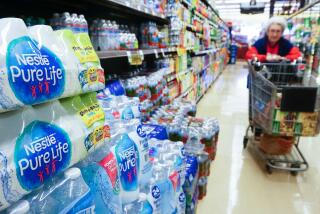Liquor Left in Crystal May Take in Lead
- Share via
WASHINGTON — Crystal wine decanters and other types of glassware can leach lead, possibly endangering wine connoisseurs and lovers of other spirits, researchers said.
Joseph Graziano and a colleague at the Columbia University College of Physicians & Surgeons in New York tested wines and liquors from crystal decanters and glasses and found that lead levels rose the longer the drink was in the vessel.
Lead, which is added to some glass for strength, durability and “a special brilliance,” can have a variety of adverse health effects, including high blood pressure, kidney abnormalities and nervous system damage, the researchers said.
“The contribution of crystal glass to these adverse health outcomes is unknown, but deserves study,” the researchers wrote last week in the British medical journal The Lancet.
“Our findings show that alcoholic beverages stored in crystal decanters steadily increase in (lead) concentration over time and that spirits kept in decanters for a long time may achieve (lead) concentrations comparable with those in the notorious sweetened wines of Roman times,” the researchers wrote.
“Infrequent drinking from such a decanter would result in rare but large doses of (lead); frequent drinking would result in repeated smaller doses,” they said.
Noting that the levels detected appeared to pose a “negligible risk” because “wine and spirits are seldom left long enough in glasses to cause harm,” the Lead Industries Assn. Inc. in New York said it was studying the issue.
“If the results on decanters reported by Dr. Graziano are confirmed, LIA would be concerned with the use of lead crystal decanters for the storage of liquors over long periods of time,” the group said in a statement. “These and other tests will help determine if future action is necessary.”
Tests showed that lead-containing decanters and glasses begin leaching lead almost immediately, and the researchers detected lead levels as high as 21,000 micrograms per liter in beverages that had been stored for long periods, they said.
By comparison, the Environmental Protection Agency limits lead levels in water to 50 micrograms per liter, and the average adult consumes between 60 and 100 micrograms of lead per day in a normal diet, Graziano said.






